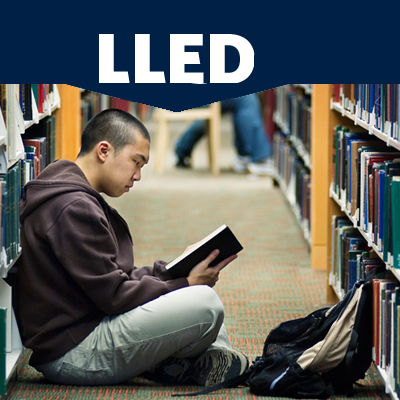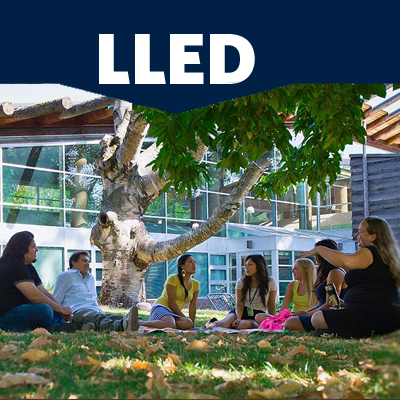
Certificate in Education – Teacher-Librarianship
Today’s teacher librarian is a dynamic teacher able to:
plan units of study collaboratively with other teachers; teach information literacy to students; develop curricula that integrates information literacy and technology; work with teachers to improve literacy learning; select quality resources and manage collections that support the curriculum, lifelong learning, and independent reading.
The diploma and certificate programs incorporate course work in educational leadership, inquiry-based learning, literacy, collaborative planning and teaching, information literacy, curriculum design and implementation, multi-media resources, and learning technologies.

Certificate TESL (Teaching English as a Second Language)
There are two types of TESL certificates: the TESL Coursework Certificate and the TESL Certificate with Practicum.
To receive the 12-credit TESL Coursework Certificate from the Department of Language and Literacy Education, a student must complete LLED 489 (6 credits) and LLED 478 (6 credits). Note that courses other than LLED 489 that may count as prerequisites for LLED 478 cannot count as credit towards the certificate.
To receive the 15-credit TESL Certificate with Practicum, a student must complete LLED 489 (6 credits), LLED 478A (3 credits), LLED 478B (3 credits) and LLED 399 (3 credits).

Diploma in Education – Literacy Education
The Diploma in Language and Literacy Education is an in-service program for teachers and administrators who wish to deepen and extend their knowledge of curriculum, instruction, assessment and evaluation for diverse types of school populations. It encompasses the various aspects of Language and Literacy Education, including: oral and written communication, reading, children’s and adolescent’s literature, drama, English education, French education, and modern languages education. Students may choose either to focus on a particular aspect of language and literacy education, to select a variety of courses from among the various areas of language arts, or a combination of the two.
A minimum of one year’s teaching experience is strongly recommended.

Diploma in Education – Teacher-Librarianship
UBC offers a 30-credit Diploma in Education – Teacher-Librarianship. This diploma meets all the course recommendations of the Canadian School Library Association. Students have the option to complete their Diploma entirely online.
The Diploma in Education – Teacher-Librarianship offers flexibility in course selection. Students are encouraged to take the required courses in any order, and at their own pace. All 30 credits must be completed within five years from the commencement of the first applicable course. If students begin their coursework as an unclassified student, they may advance their UBC coursework to a maximum of 18 credits (or, if a student has studied outside of UBC, 12 appropriate non-UBC credits) into their Diploma program. Please note that any transferred credits must also be within the five year limit.

Diploma in Education – Teaching English as a Second Language TESL
The Diploma in Education (TESL) is for teachers interested in teaching English to speakers of other languages in B.C. schools (if candidates already possess a valid B.C. teaching certificate), in adult community or academic settings, or overseas.
The prerequisite to the Diploma in Education (TESL) is a minimum of one year’s teaching experience. The program requires 30 credits of approved core and elective courses.

Doctor of Philosophy (PhD) – Language & Literacy Education (sub-specialty Literacy)
Phd students in LLED are able to sub-specialize in Literacy Education, or Modern Language Education, however, when their degrees are conferred, their degrees would only indicate a Phd in LLED.
Doctoral studies in Literacy focus on critical and contemporary issues at the intersections of literacy learning and cultural and societal transformation. Students in our programs are teachers and other professional educators who engage in courses, conversations and research addressing a broad range of issues and contexts – in and out of schools, nationally and internationally, and across the lifespan.
Students will gain expertise in topics such as identity and literacy, cultural literacy practices, Indigenous literacies, family literacy, literature and new media, digital literacies, poetry, literacy in developing contexts, literacy development across the lifespan, educational linguistics, discourse and multimodal analysis, critical perspectives on children’s and young adult literature, EAL (English as an additional language) literacy, assessment, teacher education and creative/arts-based approaches to literacy learning.
Students in our program engage with critical societal issues that impact these topics, such as equity and inclusion, immigration and globalization, gender, youth culture, relationships among communities and educational institutions, and public policy.

Doctor of Philosophy (PhD) – Language & Literacy Education (sub-specialty Modern Language Education)
Phd students in LLED are able to sub-specialize in Literacy Education, or Modern Language Education, however, when their degrees are conferred, their degrees would only indicate a Phd in LLED.
We offer specialized, individualized and interdisciplinary graduate programs in French immersion, French as a Second or Foreign Language [FSL, FFL], Asia-Pacific and the other modern language education. These programs involve study in second language curriculum, assessment, second language acquisition, bilingualism and intercultural education.
Although there are formal course requirements for the advanced degrees, students in the graduate programs are encouraged, with the aim of individualizing each program of studies, to take graduate courses in the Departments of Anthropology/Sociology, Psychology, and Linguistics in the Faculty of Arts, as well as in the Departments of Educational Studies, Curriculum and Instruction, Administrative Education, and Educational Psychology in the Faculty of Education. In this way, each program is individually tailored to suit students’ talents and interests.

Doctor of Philosophy (PhD) – Teaching English as a Second Language TESL
Integrating research and practice, the graduate programs in Teaching English as a Second Language (TESL) offer professional development to teachers of ESL and prepare researchers and leaders in applied linguistics. TESL graduate students gain experience and understanding in such areas as: current issues in TESL theory and practice; second language acquisition, second language reading and writing, language socialization, language and identity, second language assessment, discourse analysis, critical applied linguistics, and research methods.
The TESL/TEFL program accepts well-qualified students from around the globe into a richly international and multicultural academic community.

Master of Arts (MA) – Literacy Education
The Masters program in Literacy Education (MEd and MA) engages aspiring professionals in the study of rich language and literacy practices from early childhood through adolescence and adulthood. Masters level courses are offered in the areas of Early and Adolescent Literacy Practices, English Education, Children’s and Adolescent Literature, Drama and Theatre Education, Digital, Multimodal and New Literacies, Adult, Family and Community Literacies, and Teacher-librarianship.

Master of Arts (MA) – Modern Language Education
We offer specialized, individualized and interdisciplinary graduate programs in French immersion, French as a Second or Foreign Language [FSL, FFL], Asia-Pacific and the other modern language education. These programs involve study in second language curriculum, assessment, second language acquisition, bilingualism and intercultural education.
Although there are formal course requirements for the advanced degrees, students in the graduate programs are encouraged, with the aim of individualizing each program of studies, to take graduate courses in the Departments of Anthropology/Sociology, Psychology, and Linguistics in the Faculty of Arts, as well as in the Departments of Educational Studies, Curriculum and Instruction, Administrative Education, and Educational Psychology in the Faculty of Education. In this way, each program is individually tailored to suit students’ talents and interests. The MEd and MA degrees are available on a part- or full-time basis and have no residency requirement.

Master of Arts (MA) – Teaching English as a Second Language TESL
Integrating research and practice, the graduate programs in Teaching English as a Second Language (TESL) offer professional development to teachers of ESL and prepare researchers and leaders in applied linguistics. TESL graduate students gain experience and understanding in such areas as: current issues in TESL theory and practice; second language acquisition, second language reading and writing, language socialization, language and identity, second language assessment, discourse analysis, critical applied linguistics, and research methods.
The TESL/TEFL program accepts well-qualified students from around the globe into a richly international and multicultural academic community.

Master of Education (MEd) – Modern Language Education
This Master’s program consists of 30 course credits and is taught entirely in French, with the exception of certain readings in English (papers may be written in English). Participants must therefore be comfortable with written and spoken French. Each year of the two-year program begins with a three-week course in Montreal in July. During the remainder of the year, three courses will be taught from September to June. Students attend these courses online via teleconferencing. Action research on learning a second language or on a theme related to French as a second language forms the core of this program. Accordingly, the program will include courses in research methods as well as courses related to bilingualism and the acquisition and teaching of a second language. In addition, students will investigate a specific topic relevant to their own classrooms.

Master of Education (MEd) – Teaching English as a Second Language TESL
Integrating research and practice, the graduate programs in Teaching English as a Second Language (TESL) offer professional development to teachers of ESL and prepare researchers and leaders in applied linguistics. TESL graduate students gain experience and understanding in such areas as: current issues in TESL theory and practice; second language acquisition, second language reading and writing, language socialization, language and identity, second language assessment, discourse analysis, critical applied linguistics, and research methods.
The TESL/TEFL program accepts well-qualified students from around the globe into a richly international and multicultural academic community.

Master of Education (MEd) – Literacy Education Online Cohort
This online graduate program allows students to read and engage with the latest research in the field of Literacy education, and connect research to practice.
This program aims to personalize the learning for each admitted cohort. Depending on each cohort’s learning needs, adjustments will be made in the delivery of courses. Students will be encouraged from the beginning of the program to engage in self inquiry by bringing their personal questions into synchronous and asynchronous conversations, and exploring the answers to these questions through their course assignments and graduating project.

Master of Education (MEd) – Modern Languages: French Online Cohort
For teachers in French Immersion, Francophone, Core French and Intensive French Programs.
This graduate program allows teachers to explore their classroom practices from a research-informed perspective by placing the focus on their specific interests related to French language teaching, for example: multiliteracies and translanguaging, intercultural learning and curriculum renewal through indigenization, using gaming to teach French, social justice and inclusive practices in French language programs, as well as other current issues.

Master of Education (MEd) – Teaching English as a Second Language Online Cohort
The goal of this online graduate program is to develop specialized professionals in the field of Teaching English as a Second Language (TESL).
The Master of Education in Teaching English as a Second Language is a graduate-level, part-time and online cohort program that allows students to gain theoretical and practical knowledge in areas such as applied linguistics for teachers; second and foreign language acquisition; English proficiency assessment; language, discourse, and identity; multilingual literacy and multimodality, and more!